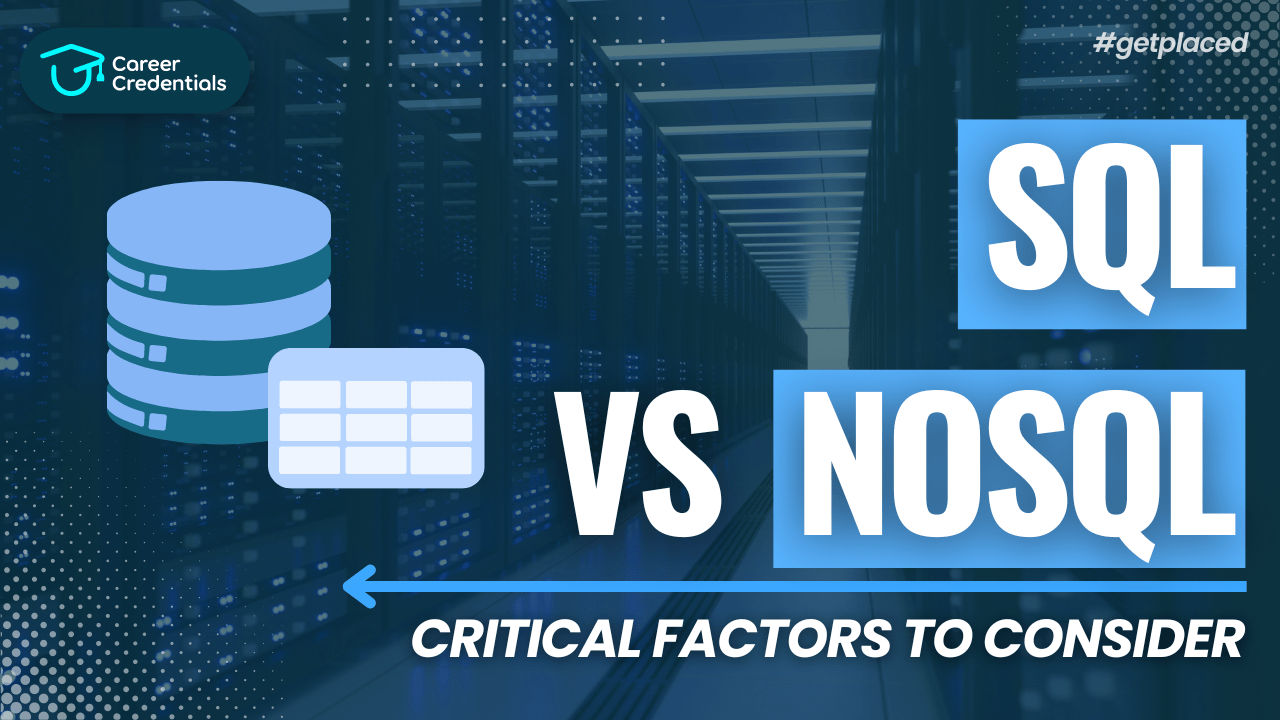SQL vs NoSQL: Critical Factors to Consider

In today's data-driven world, choosing the right database system for your application is crucial. This blog delves into the fundamental differences between SQL and NoSQL databases, helping you understand which system best suits your project needs.
Check Out: SQL Roadmap by Career Credentials for FREE!!
What is SQL?
SQL, or Structured Query Language, is a domain-specific language used to query and manage data in relational databases. It allows users to perform various operations such as querying, inserting, deleting, and updating records. Additionally, SQL supports complex logic through transactions and embedded procedures like stored functions or views, making it a powerful tool for managing structured data.
Enroll Now: SQL Masterclass by Ashish Gadpayle and elevate your database skills to a professional level!
What is NoSQL?
NoSQL stands for "Not only SQL." It encompasses a variety of database technologies that store and retrieve data using non-relational data structures, such as documents, graphs, and key-value pairs. Designed to be more flexible and scalable than traditional relational databases, NoSQL systems can easily adjust to changes in usage or load, making them ideal for dynamic applications.
Enroll Now: MongoDB Roadmap by Career Credentials for FREE!!
Why Choose NoSQL Over SQL?
NoSQL databases are often preferred for their flexibility and scalability. They allow developers to store and access data quickly without the constraints of a predefined schema. This freedom enables development teams to focus on delivering features and core business logic faster. NoSQL databases are particularly advantageous for applications with large volumes of unstructured or semi-structured data and those requiring frequent schema changes.
Which is Better: SQL or NoSQL?
The choice between SQL and NoSQL depends on your specific project requirements. If your application demands complex data queries and transactional support, an SQL database may be more suitable. On the other hand, if you need a fast, scalable, and flexible database for web applications, a NoSQL system might be the better choice. Ultimately, there is no one-size-fits-all solution; your decision should be based on the particular needs of your project.
Key Differences Between SQL and NoSQL Databases
To make an informed decision, let's explore five key differences between SQL and NoSQL databases:
1. Database Architecture
Relational (SQL) Databases:
- Use Structured Query Language (SQL) to manage data.
- Store data in rows and tables.
- Use primary and foreign keys to connect data across tables.
Non-Relational (NoSQL) Databases:
- More flexible, without a rigid structure.
- Store data using various models such as documents, graphs, or key-value pairs.
- Do not require predefined schemas.
2. Schemas and Query Languages
SQL Databases:
- Use a predefined schema, requiring significant upfront preparation.
- Ideal for complex queries but can be restrictive.
- All data must conform to the same structure, making schema changes difficult.
NoSQL Databases:
- Feature dynamic schemas for unstructured data.
- Allow each document to have its own structure.
- Support various storage models, offering greater flexibility.
3. Scaling
SQL Databases:
- Vertically scalable (adding more power to a single server).
- Limited by the capacity of the server's hardware.
NoSQL Databases:
- Horizontally scalable (adding more servers to handle higher traffic).
- Better suited for large and rapidly changing data sets.
4. Data Structure
SQL Databases:
- Table-based, with each field corresponding to a table column.
- Effective for multiple data transformations and complex relational queries.
NoSQL Databases:
- Use flexible data models such as document, key-value, graph, or wide-column stores.
- Easier for developers to handle varied and unstructured data.
5. Use Cases
SQL Databases:
- Suitable for multi-row transactions and applications with complex joins.
- Commonly used in legacy systems built around a relational structure.
- Ideal for applications requiring ACID properties (Atomicity, Consistency, Isolation, Durability).
NoSQL Databases:
- Best for applications with dynamic data and no join operations.
- Suitable for handling large, unstructured data like documents or JSON.
- Preferred for high-performance, scalable web applications and mobile apps.
Also Read: Top 10 Programming Algorithms Every Programmer Should Know by Career Credentials
Examples of SQL and NoSQL Database Systems
SQL Databases:
- MySQL: Open-source, widely used, and stable.
- Oracle: Commercial, supports huge databases, expensive but robust.
- Microsoft SQL Server: User-friendly, well-documented, best for small-to-medium organizations.
- PostgreSQL: Hybrid SQL/NoSQL, free and open-source, high ACID compliance.
NoSQL Databases:
- MongoDB: Popular, free, dynamic schema, horizontally scalable.
- Cassandra: Handles large data volumes, highly available, scalable, open-source.
- Redis: Key-value store, excellent for caching and real-time applications.
- CouchDB: Document-oriented, known for ease of use and reliability.
When to Use SQL vs NoSQL
Choosing between SQL and NoSQL comes down to the type of application you're building and its data requirements. Consider the following:
- Use SQL when:
- You need structured data with consistent relationships.
- Complex queries and transaction management are required.
- Your application demands high data integrity and ACID compliance.
- Use NoSQL when:
- You have large, unstructured, or semi-structured data sets.
- The application requires high performance and scalability.
- Rapid development and schema flexibility are important.
Enroll Now: MongoDB Roadmap by Career Credentials and master web development effortlessly!
Conclusion
Understanding the key differences between SQL and NoSQL databases is essential for choosing the right database for your project. SQL databases offer robustness and reliability for structured data and complex queries, while NoSQL databases provide flexibility and scalability for dynamic, unstructured data. By considering your specific application requirements and data needs, you can make an informed decision that enhances performance, ensures data integrity, and supports the successful development of your application.
Confused About Your Career?
Don't let another opportunity pass you by. Invest in yourself and your future today! Click the button below to schedule a consultation and take the first step towards achieving your career goals.
Our team is ready to guide you on the best credentialing options for your aspirations.
Let's build a brighter future together!
Empower Yourself. Elevate Your Career at Career Credentials Where Education meets Ambition.
